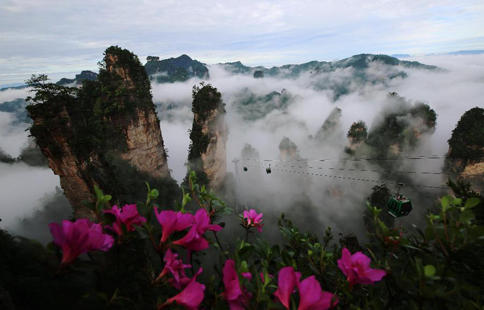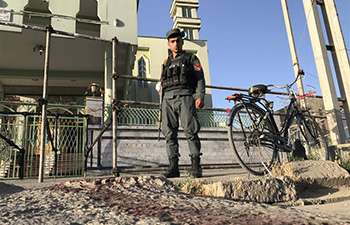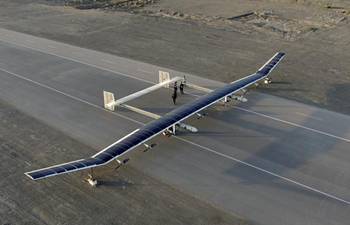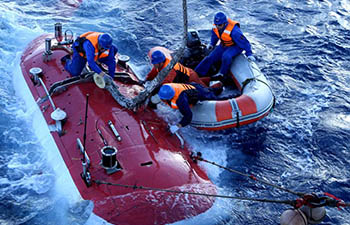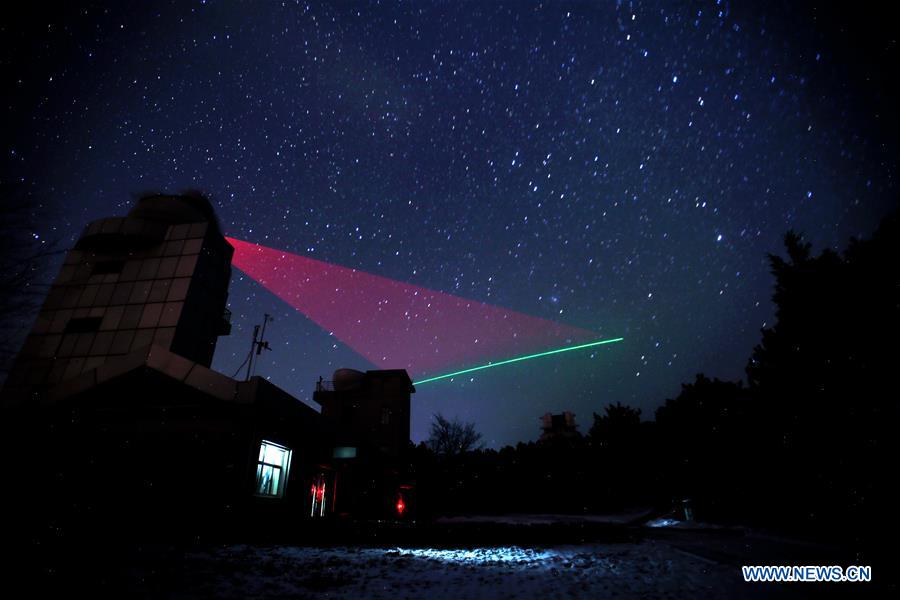
Photo taken on Nov. 26, 2016 shows a quantum communication ground station in Xinglong, north China's Hebei Province. Chinese scientists on Thursday reported a major breakthrough in quantum communication: A pair of entangled photons over a distance of 1,200 km have been successfully transmitted from space to Earth. The previous record was about 100 km. (Xinhua/Jin Liwang)
BEIJING, June 16 (Xinhua) -- At the remote western city of Delingha of China's Qinghai province, a bright green light appeared above the quantum communication ground station early Thursday, then disappeared a few minutes later.
At Washington, the United States, the time was Wednesday afternoon. Xinhua reporter was busily collecting feedbacks from many international scientists on this event happening in China.
"A giant step," "a heroic experiment," "a major technical accomplishment,".... On the eve of the publication of the Chinese team's article "Satellite-based photon entanglement distributed over 1,200 kilometers" on the magazine Science, Delingha and Washington seemed to be entangled as well.
Chinese scientists on Thursday reported a successful transmission of "entangled" photon pairs from the satellite Micius in space to China's Delingha ground station and Lijiang ground station separated by 1,200 km, a major breakthrough towards quantum communication over great distances.
Quantum entanglement, a physical phenomenon once described by Albert Einstein as "a spooky action at a distance," is a curious phenomenon in which particles are "linked" together in such a way that they affect one another regardless of distance.
Located at a remote region in western China, Delingha used to be an unknown small city with an altitude of over 3,200 meters and a small population.
To coordinate with the experiment time, researchers at the Delingha quantum communication ground station normally work from 6 p.m. to 3 a.m., living days and nights upside down.
Li Shuanglin, the current rotating researcher, told Xinhua: " I've gotten used to this lifestyle. After finishing the experiment early in the morning, I'll go fast asleep. It's the days without experiments that haunt my sleeping."
In Washington, the "brain" of America's science and technology industry, the experiment in China's Delingha has caused a big storm. "Ring, Ring, 'Earth? It's space calling, on the quantum line,'" Science wrote it as the introduction headline for China's paper in the magazine.
"This is a heroic experiment because so many detrimental factors were working against researchers (and) attempting to destroy a quantum nature of the photonic entanglement in this landmark experiment," Alexander Sergienko, a quantum physicist at Boston University, told Xinhua.
"Chinese researchers deserve a greatest praise and acknowledgement of their skills, persistence, and devotion to science," he added.
Thomas Jennewein, an associate professor of quantum information at the University of Waterloo, who is currently pursuing a quantum communication satellite project in Canada, said there is a "quantum space race."
"I would like to say that the Chinese group has overcome several major technical and scientific challenges and clearly demonstrated their world leadership in the field of quantum communication," he said.
The Science website published China's paper online at 2 p.m. EST on Thursday (1800 GMT). Minutes later, Xinhua reporter in Washington found that many world-renowned media have swarmed to report the news, including the Washington Post, Newsweek, BBC and Nature.
On the other side of the planet, it was another clear night at Delingha, with bright moonlight and a few clouds in the sky. Researchers at Delingha quantum communication ground station successfully finished another experiment, and went to bed.





